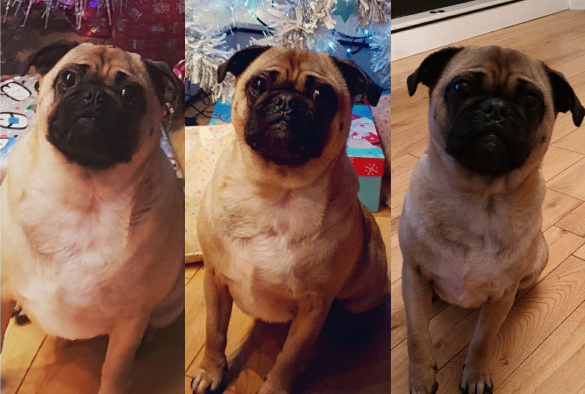The University of Liverpool’s Royal Canin Weight Management Clinic is celebrating its 15th birthday. Since it was opened in 2005, the clinic has helped almost 500 cats and dogs to shed almost two tonnes of their body weight.
The state-of-the-art pet obesity clinic is based at the University’s Small Animal Teaching Hospital and was the first of its kind in Europe. It is run by world-recognised specialist in companion animal obesity Professor Alex German and Georgia Woods, who is one of only two Veterinary Nurses in the UK to hold the Veterinary Technician Speciality in Nutrition.
Ollie the pug (pictured) is one of the clinic’s most recent success stories. On average, pets managed through the clinic lose 20% of their body weight. Despite the challenges of lockdown, Ollie has exceeded all expectations and shed over a third of his body weight in just 10 months. He is now just 500g from his target weight and is unrecognisable from his former self.
His owner, Mr Glascott of Wigan, Greater Manchester said, “Before Ollie would spend much of his day sleeping, whereas now he loves playtime and exercise and runs during walks, which is a first! He now loves being active and can keep up during playtime with children or on longer walks off the lead. Ollie’s breathing is now perfect – even during hotter weather – and his allergies are also completely under control. We are incredibly grateful to Georgia and the clinic for supporting us and helping Ollie lose 5.4kg, which has made him feel so much better and healthier.”
Alex and Georgia have helped almost 70 different breeds of dogs to lose weight, but the breeds that are referred to them most often are:
- Labrador
- Cavalier King Charles Spaniel
- Cross breeds
- Pug
- Golden Retriever
- Border Collie
- Dachshund
- Yorkshire Terrier
- Bulldog
- Cocker spaniel
Alex German, Royal Canin Professor of Small Animal Medicine said, “Over the last 15 years, we have learnt a lot about obesity in dogs and cats – what causes it, the health problems it brings and how best to manage it. We are delighted at how our insights have helped veterinary professionals to achieve success in managing obesity in the pets that they care for. However, above all we have loved sharing the journeys of the many pets and owners in reaching their goals, and seeing for ourselves the improvements in quality of life that this brings.”
Georgia Woods, Royal Canin Weight Management Clinic Nurse said, “I am delighted to have been part of the Weight Management Clinic’s achievements and to reach these milestones. It has been so rewarding for me to meet so many wonderful owners and to see the transformations and improvements to the quality of life of our patients. Obesity care can be challenging at times, but I have immensely enjoyed helping and guiding pet owners and their pets to success. I am also hugely proud of the education we have been able to provide to other vets and nurses across many countries, sharing our knowledge and helping them improve obesity care in their own practices. I’m very excited to continue the work to improve obesity care strategies and to see what the next years will hold”.
Dr Lauren Hayes, Scientific Affairs Manager at Royal Canin said, “The University of Liverpool Weight Management Clinic and Royal Canin have worked together closely over the past 15 years and we are delighted to celebrate in their successes. We are proud to work with world-leading experts in their field who not only improve the health of the patients they see, but also by promoting education and research around obesity and into addressing it to help make a better world for pets. Having helped over 500 patients since the clinic was launched, it is an incredible milestone and we look forward to their continued successes for the future.”
Cats and dogs from across the country are referred to the clinic by veterinarians to receive specialist weight management programmes. The clinic is supported by cutting-edge technology such as dual-energy X-ray absorptiometry (DEXA) which very precisely measures the body fat of pets and is used to create tailored individual therapies.
When pets come for a consultation at the clinic they are given a full clinical examination, full blood and biochemical tests. Their body weight and body fat composition is measured and they are given a tailor-made weight loss and exercise programme. Pets attend the clinic for check-ups every one to three weeks during the weight loss programme.
